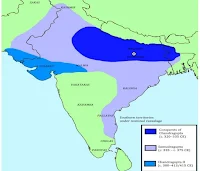Gupta Empire (400-600 AD) All Notes
Gupta Empire (400-600 AD)
Gupta Empire
▪ On ruins of Kushan Empire rose Gupta Empire
▪ Constituted majority of UP & Bihar
▪ Main center of power at Prayag (Allahabad)
▪ Founder of Gupta Dynasty was Sri- gupta
▪ Srigupta was succeeded by Ghatochkacha
▪ Both of them were called Maharaja
Chandragupta 1
▪ 1st to be called as Maharajadhiraja (Great king of kings)▪ Married Lichchhavi princess which gave him strength & prestige
▪ Considered to be founder of Gupta era as a mark of his ascension
▪ Mehraulli iron pillar inscriptions mentions his extensive quests
Samundragupta
▪ Known as greatest ruler of Gupta dynasty & Napolean of India▪ Was opposite of Asoka & delighted in military conquest.
▪ Inscriptions of his military conquest are mentioned (in sanskrit with Nagari script) on same Allahabad pillar which carries inscriptions of peace loving Asoka
▪ Samundragupta never knew any defeat & conquered east till Assam, west till eastern Afganistan, North till Kashmir & south till Tamilnadu
▪ Was a lover of art & literature, Self-proficient in music & poetry, hence called Kaviraja
▪ Patronised many poets & scholars along with famous Harisena
▪ Was an ardent follower of vaishnavism but tolerant to other religions
Chandragupta 2 (Chandragupta Vikramaditya)
▪ His reign saw high watermark of Gupta Empire▪ Extended his empire by military conquests & marriage alliances
▪ Defeated Shakas in Malwa & Gujrat & conquered western sea port, henceforth, Ujjain became 2nd
capital of Guptas, 1st being Prayag
▪ His exploits as Chandra has been mentioned on Qutub iron pillar Delhi
▪ His reign at Ujjain court saw numerous scholars including “Kalidasa & Amarsimha”
▪ It was his reign under which chinese pilgrimage Fa-hsien / Fahien (399-414 AD) visited India
Fall of Gupta Empire
▪ Due to invasion of Hunas from central Asia
▪ Due to rise of Yashodharman in Malwa
▪ Due to dissention within the royal family & weak rulers
▪ The later Gupta’s embraced Buddhismwhile their predecessors were staunch Hindus.
Gupta’s Administration
▪ Unlike Mauryas, Guptas assumed titles like parmeshwara, Maharajadhiraja & Paramabhattaraka
▪ Provinces in Gupta’s period were known as Bhuktis & provincial governors Uparikas
▪ King maintained close contacts with provincial administration through a class of officials called “Kumaramatyas” & “Ayuktas”
▪ Provinces were divided into districts Vishayas under charge of Vishayapati
▪ All foreign affairs were looked after by foreign affair minister known as “Sandivigraha”
▪ Villagers were subjected to forced labour called Vishti for serving royal army & officials Religion & Social Culture
▪ Brahamans formed the top ladder & receive numerous gifts
▪ Brahamanism reigned supreme during Gupta period & had 2 branches mainly, Vaishnavism & Shaivism, with former more prevalent (Bhagavatism)
▪ Fahien accounts shows a decline of Budhhism in Gangetic valley but a few budhhist monks like Vasubandhu were patronised by Gupta kings
Art & Culture
▪ Gupta age is called golden age of India in field of art, science & literature
▪ Nagara & Dravidian styles of art evolved during this period
▪ Delhi iron pillar, 7 ½ feet Buddha statue & Deogarh temple are finest example of Gupta art
▪ Mural paintings of Ajanta, which mainly depicted life stories of Buddha as in Jtaka stories belong to this period (Paintings at Sigiria in Srilanka are influenced by Ajanta paintings)
Literature
▪ Sanskrit became primary language in Gupta period
▪ Ramayana & Mahabharata were compiled during this period



